Richard Hadlee opens up on his rivalry and incredible friendship with Dean Jones
Dean Jones was expecting a verbal showdown when Richard Hadlee stormed into the Aussie dressing room one day. Instead, he handed him a beer in a moment that launched a lifelong friendship.
Cricket
Don't miss out on the headlines from Cricket. Followed categories will be added to My News.
Cricket legend Sir Richard Hadlee has claimed he valued Dean Jones’ friendship more than his wicket and will always cherish the memory of sharing Jones’ final Christmas lunch.
The Hadlee-Jones friendship was one of cricket’s quirkiest unions but one which showcased some of the sport’s most endearing qualities.
New Zealand fast bowling legend Hadlee dominated Jones by dismissing him three times in three Tests in the 1986-87 Australian summer, taunting him with newspaper columns which claimed: “I’ve got the wood on Dean Jones.”
Jones made up some ground in white ball cricket and the duo became firm friends after Jones played Hadlee for the final time in a 50-over game and stormed into the New Zealand dressing room.
Watch every match of the 2020 IPL Season LIVE on Fox Sports with Kayo. New to Kayo? Get your free trial now & start streaming instantly >
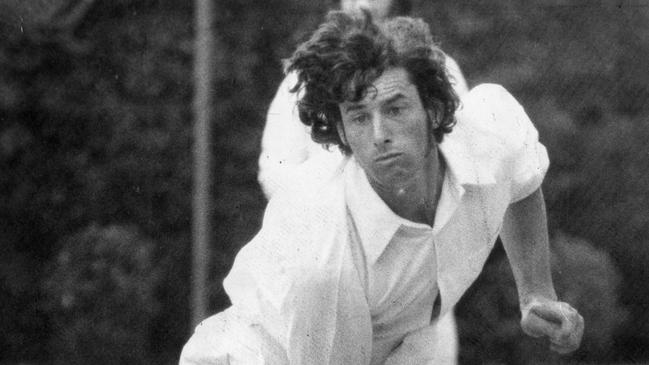
Jones was expecting a verbal showdown but Hadlee burst the bubble by handing him a beer and the two chatted at length and stayed friends ever since.
Hadlee accepted an invitation from Jones to join his family for Christmas dinner when he was in Melbourne for last summer’s Boxing Day Test.
Old rivalries were forgotten but only until Hadlee brought out his Christmas present for Jones — a pillow case featuring a bunny’s head on it.
“Deano’s lunch invitation was just a wonderful gesture which took me by surprise,’’ Hadlee told News Corp from Christchurch.
“We were going to be based in Melbourne. He took the time to come and pick us up in his sports car. It was an absolute delight. We had some ding-dong battles on the field but I will cherish his friendship — and that lunch — even more.’’
Hadlee, like the rest of the cricket world, was completely taken aback by Jones’ death from a heart attack at age 59.
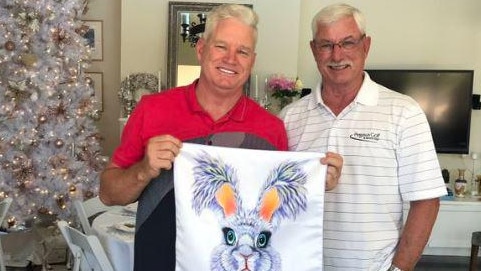
“I was shocked — it is hard to put words to it. We have been mates for 35 years. We have been competitors. We have enjoyed each other’s company. All of a sudden he is gone.
“I will cherish every memory of him. This has happened far too early.
“The thing was about our rivalry that I cannot remember a terse word being exchanged. There might have been a wink or a nod. It was intimidation without saying anything.
“And that was both ways. Abuse was never my style and it wasn’t his. We did what we had to do. It was tough sport.
“We never lost focus of how to play in the right spirit and we would share a dressing room beer. We stayed in contact after retirement and he would contact me asking what I thought about issues. We would debate things and would not always agree. In fact we would harp each other up just to get a reaction.
“Being a commentator he was always looking for new ideas and how to grow the game. Those things were a lot of fun. He loved the game. He lived and breathed it. An absolute legend.
“We did public speaking gigs together and we would bounce off each other. We entertained a lot of people.”
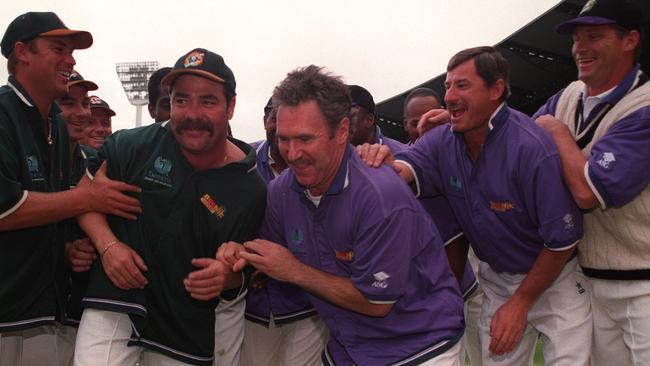
HOW A PAIR OF SHADES ENDEARED JONES TO GENERATIONS
Sam Landsberger
Australia’s batting plans for the Twenty20 World Cup that was due to start next month included one golden rule.
“The team that’s going to win the World Cup is the one that runs the most twos,” opener David Warner said.
The Aussies wanted to, in Steve Smith’s words, “hit the gaps and run your backside off” in pursuit of their first T20 crown.
In 1987 that was one of the ingredients that helped Dean Jones run Australia to its maiden ODI World Cup.
“He was dynamic between the wickets,” Andrew Symonds reflected on Friday.
“One of the best runners between the wickets we’ve ever seen in cricket, probably.
“He was a very flamboyant batsman, but also a flamboyant person.”
“He changed the way the game was played.”
Glenn Maxwell has famously claimed that he plays cricket to entertain.
“What makes me be the person I’d want to come and watch play cricket is being the guy that’s trying to entertain and the guy that’s trying to win the game for his team,” Maxwell said.
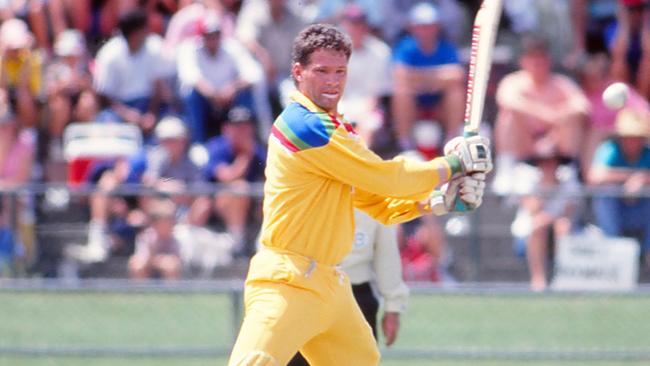
Well, it should come as little surprise that Maxwell the boy grew up with a poster of Jones on his bedroom wall in Melbourne’s outer east.
But for Symonds the symbol for Jones’ reincarnation of cricket wasn’t necessarily a cavalier stroke or a sprightly 20m run.
“He was the one who started wearing sunglasses and all that sort of stuff. So he sort of revolutionised cricket into the modern era,” Symonds said.
“You stand in the Australian sun for however many years of your life, so to protect your eyes and the skin and everything he was the pioneer of that, I reckon.
“A lot of blokes now have pretty big sunglass contracts as a result of it.”
With the shades off and the gloves on, Symonds said that Jones would hit the fast-forward button in matches.
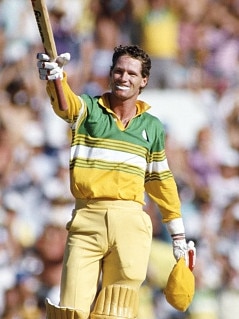
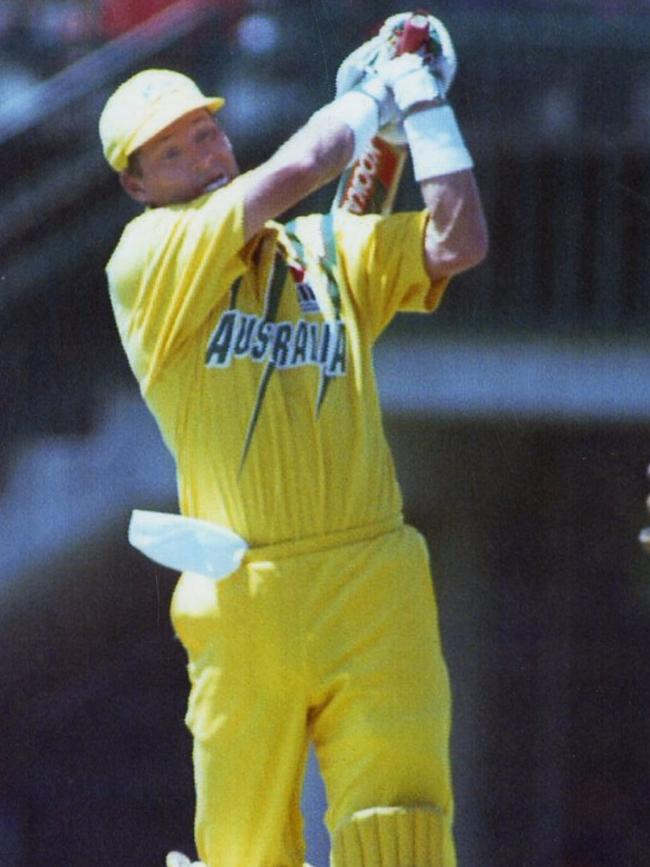
“The biggest thing with him was he’d make things happen, and in a team that’s what you want,” he said.
“They’re the sort of players you want to be in and around.
“He didn’t stand idly by just letting the game roll on. When he came out to bat the tempo of the game would change.”
Jones was a mix of crash and craft that back then the game hadn’t really seen.
“He was before his time,” said Shaun Graf, long-time Victoria powerbroker and a brief teammate of Jones.
“Someone who had the ability to change how we adapted and played a game, being the one-day game, which is quite amazing.
“That doesn’t happen too often. Those sort of players come across your desk maybe once in a decade.
“But he’s someone that’s done that, just like Warney (Shane Warne) did.
“Warney’s changed how everyone viewed leg spin bowling and how you can win from any position.
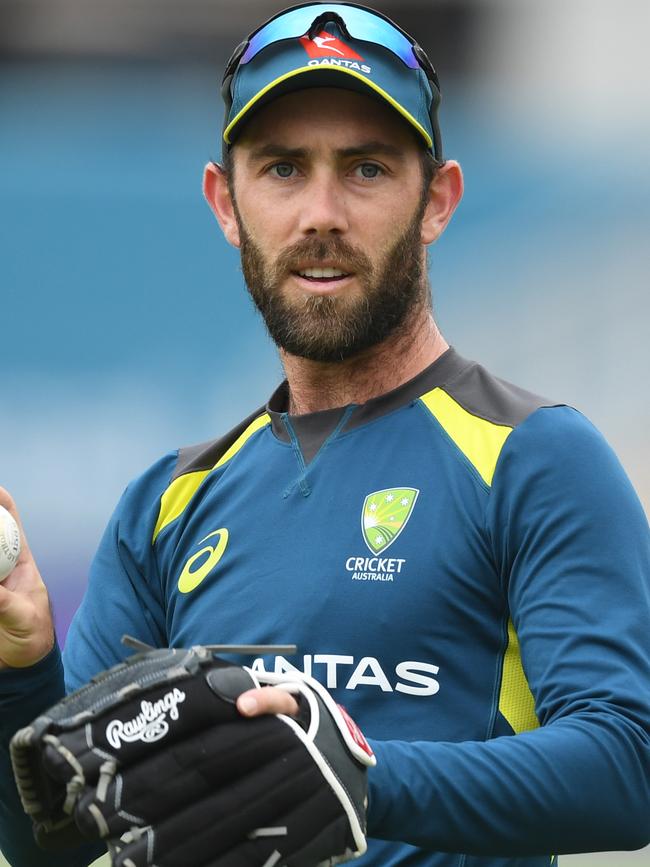
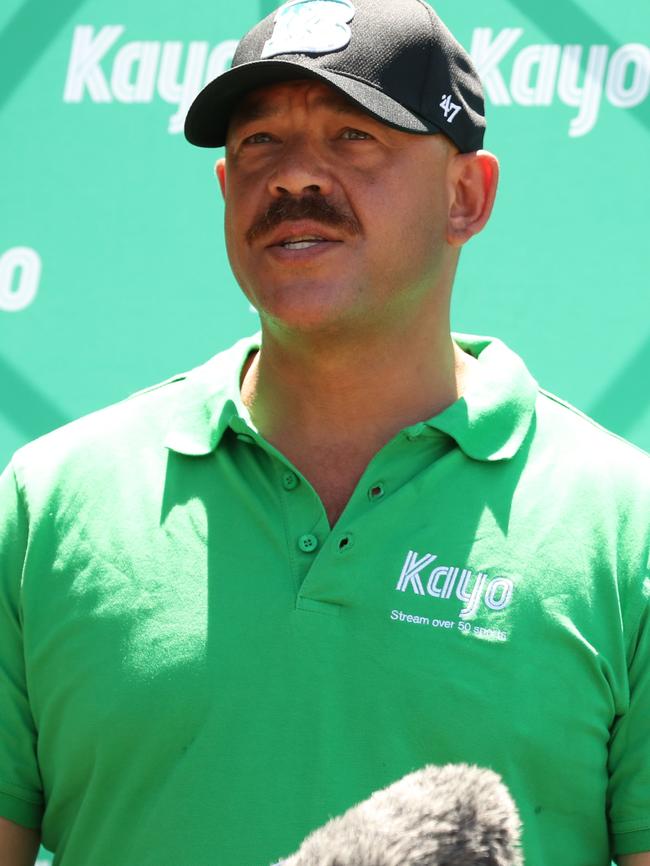
“Deano changed how you actually went about it.”
How did he do it?
“They played one-day cricket very much in an orthodox manner of the traditional game, whereas Deano played in a very unorthodox manner where he hit the spots that you didn’t hit, and he hit in the air to spots that you wouldn’t dream of if you were a Test cricketer,” Graf said.
“His running between the wickets and his fielding were also amazing as well. He was a competitive rooster and you could tell by the way he used to walk to the wicket.
“He used to strut out there very quickly because he wanted to get in the contest. He loved the contest and he definitely changed the game.”
In 1996, as Jones’ career drew to a close and Symonds’ began, they faced off in a Sheffield Shield match.
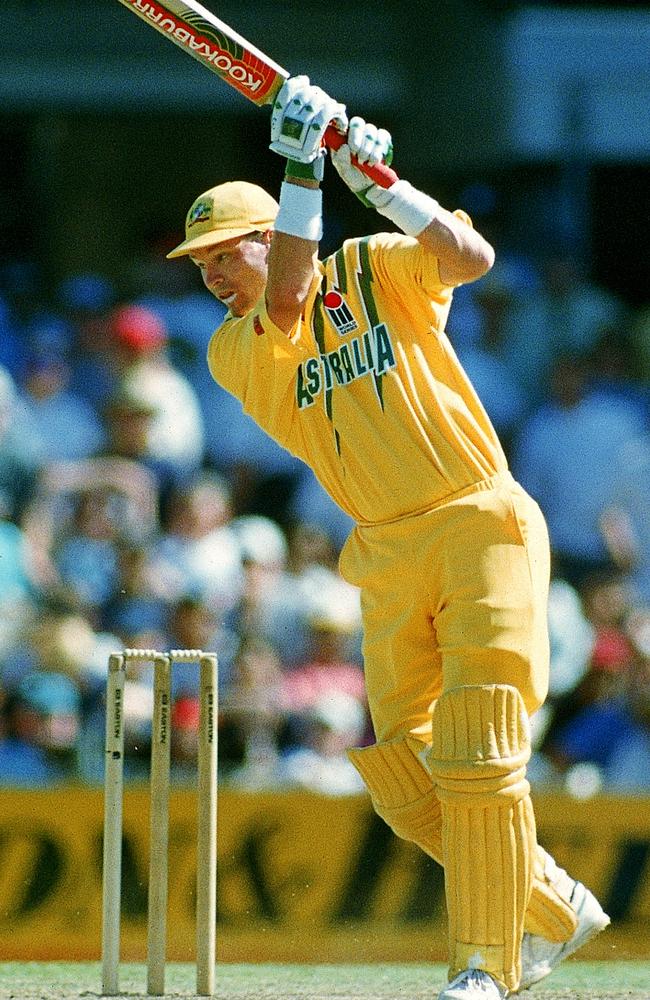
“He said make the game yours however you like,” Symonds said.
“Don’t let someone tell you how to play. You find your own way and as you prove and develop you can become unique.
“He had an air of confidence about him that I suppose Australian cricket maybe hadn’t had for a little time.”
The shrewd feedback rolled on as Jones moved behind the microphone.
“He watched a lot of cricket and whenever I saw him he’d watched me bat,” Symonds said.
“He’d say, ‘Mate, you’re getting across into the line of the ball a bit, stay more legside of it and play to your strengths, which is hard and to the off-side’.
“And you’d go, ‘Yeah, you’re right’. He really cared about the state of Australian cricket, he was very passionate.
“And if you’d been playing well he’d say, ‘Mate, just keep doing what you’re doing, I’ve enjoyed watching you’.
“He was always honest, too, Deano. Sometimes arguably too honest, but the thing with him was he was never false to me.”
RIP DEANO: THE CRICKET MAVERICK WHO NEVER GREW UP
Some cricketers grow old quickly — others seem trapped in their boyhood until the day they leave us.
There was a part of Dean Jones that never aged — the cricket junkie with a million theories, a man whose love of the game was as rich the day he died as it was when he first surged onto the Australian cricket scene as a fearless, debonair new talent in the early 1980s.
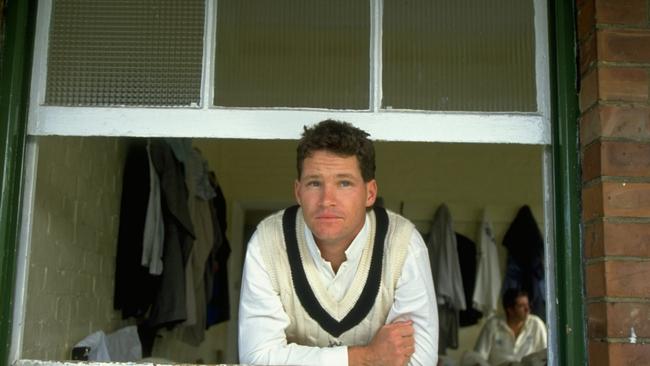
The last time I spoke to him before he left for the Indian Premier League he chatted with typical restless energy about a couple of pet theories such as why he thought Travis Head should leave the comfort of South Australia and venture into the lions den of NSW to toughen him up.
It was typical Deano … left-field, controversial, unlikely to happen but, the more you thought about it, the more you got his point.
When coaching T20 cricket teams in Asia he spent hours researching statistics that showed teams that won the 17th over of a T20 match normally won the game so he would tell his team “you must win that over.’’
Again, quintessential Deano … anything but the obvious, a man who kept us all thinking.
The cricket world is shattered today for it has lost one of its greatest characters, a totally original maverick talent whose contribution went far beyond mere statistics – however excellent they were.
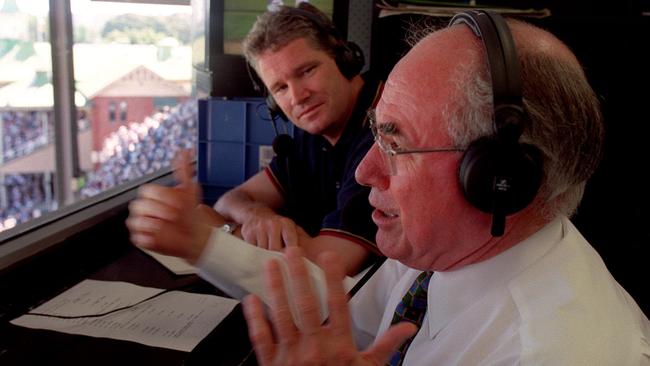
The hustle and bustle he brought into 50 over cricket in the 1980s dignified and electrified the entire game.
Just watching him walk to the wicket with that super cool strut was enough for some fans but like a lot of swaggers they hid deeper insecurities.
Cricket was a brutal game for players like Jones who came through in the mid-1980s when Australia went four years without winning a series.
He rarely spoke about it publicly but some of the dressing downs he received from senior players in the early Test sides he played in left scars which never truly healed.
He loved Allan Border but he fell out with others. He admitted he might have needed to be brought down a peg or two but in his early years but not as savagely as he was.
Later in life he would occasionally tell stories about himself and poke fun at his own insecurities.
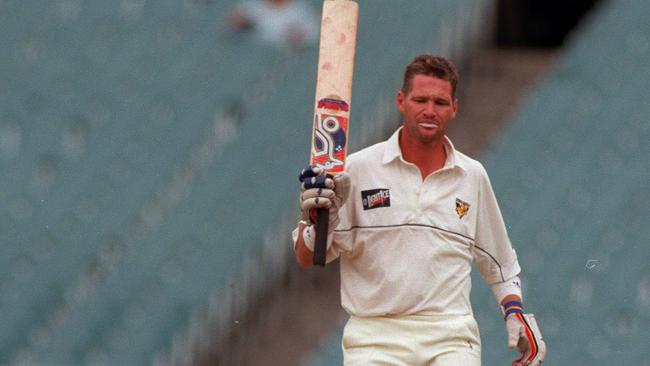
Like the time, when computer analysis was just coming into the game in the 1990s, and he saw Queensland coach John Buchanan had left a tape saying “Victoria’s batsmen’’ near the Gabba indoor nets.
“I couldn’t help myself,’’ he said with a grin.
“I swiped the tape, hid it in my bag, and took it back to the hotel and watched it.
“They correctly identified I could not play the cover drive so they planned to bait me outside off stump.
“I was filthy so the next day I went five hours not driving at one ball outside off stump to teach them a lesson.
‘They cracked in the end. I loved it.’’
Matthew Hayden, watching from gully, loved the contrariness of it all and said watching Jones starve himself of cover drives was a pivotal moment in his own career because it taught him what strong willed cricket was all about.
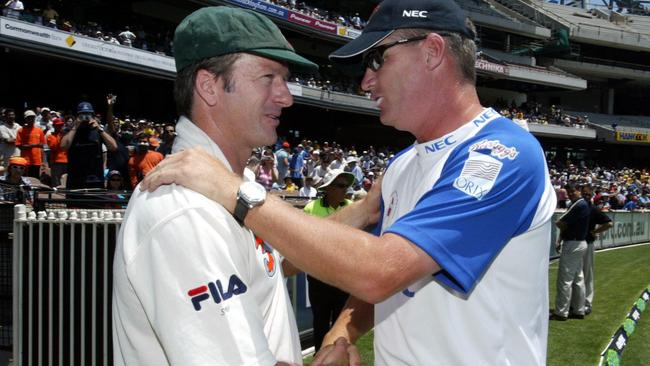
Jones averaged 46.55 in Tests — an exceptional effort given he played in such a turbulent era and never felt comfortable or truly supported.
For all the impact of his jaunty swagger, Deano was a man who craved to be loved and he rarely felt that way.
He was hurt that while he was a coach in demand in overseas T20 competitions there was no-one knocking on his door in Australia.
The absolute golden stud of his career was his 210 in the Tied Test against India in Madras in humidity so thick that the keys on the typewriters of Australian journalists writing about it were punching through wet pages which were moistened by the air density.
MORE ON JONES:
Dean Jones dead: Mark Waugh says the architect of modern cricket deserves highest honour
Adam Gilchrist reveals why Dean Jones was his favourite player growing up
Most of those who were there still swear it has to rank as the greatest Test innings by an Australian. It seemed every time Australia played a future Test in that city any player who sweated their way to any score above 50 would return to the dressing room and say “Dean Jones must have been a freak.’’
That treasured double century will be remembered for as long as the game is played … just like the man who played it.
Originally published as Richard Hadlee opens up on his rivalry and incredible friendship with Dean Jones

